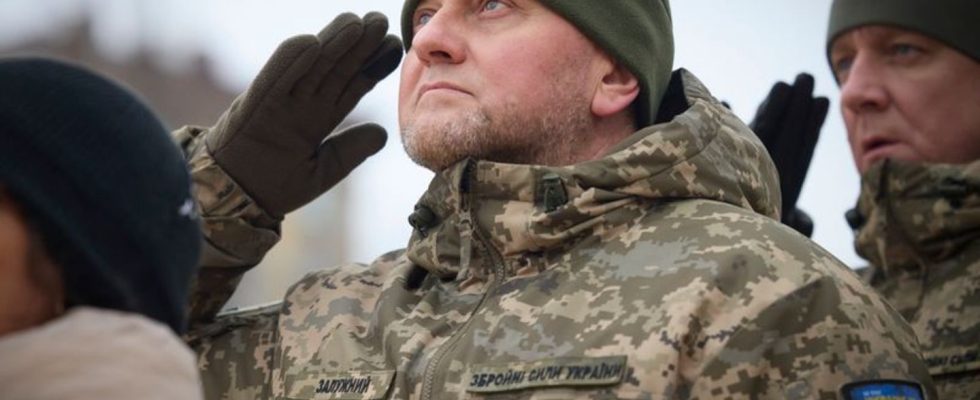Power struggle in Kyiv
Why Zelensky wants to get rid of his army chief
The Commander-in-Chief of the Ukrainian Armed Forces: Valery Zalushnyy. photo
© Ukrainian Presidential Press Office/AP/dpa
Arguments about the right strategy or offended vanities? In Ukraine, President Zelensky and Commander-in-Chief Saluzhny were once considered a successful tandem – now they are at odds.
The supposedly imminent dismissal of Ukrainian Commander-in-Chief Valeriy Zalushnyj in the middle of the war is sending the Ukrainian media into a frenzy. Even a week after alleged insider information emerged, there is still no official confirmation of the president’s reported replacement of the popular general Volodymyr Zelenskyj, but spicy internal matters continue to flow: According to this, there was already a meeting between the two, at which the president suggested that the head of the armed forces resign, but he refused.
Zelensky is apparently still hesitant to fire the popular commander due to the negative public response. Many observers see Saluzhnyj as the strategist behind the successful defense of Kiev and the pushback of Russian troops from other occupied areas.
Call for a “global reset”
Those involved are also fueling the speculation: Amid the dismissal rumors, Saluschnyj shared a photo with Chief of General Staff Serhiy Shaptala on his birthday. “It will still be very difficult for us, but no one will have to be ashamed of anything,” he wrote about the recording. At the same time, the Internet portal Ukrayinska Pravda spread the rumor that Shaptala’s chair was also shaking. This would mean throwing out two of the most influential Ukrainian military personnel in one fell swoop.
In an interview with Italian television, the president revealed what was bothering him. “If we want to win, then we must all become leaders of victory,” he said, calling for a “global reset.” The head of state explained that he was not just interested in replacing the military leadership. He repeated the call for a restart in his video message on Monday. Ukraine needs “strength and fresh energy” to win.
The president apparently misses this with Saluschnyj after he spoke of a stalemate in a highly regarded interview and an essay for the British magazine Economist in November. “There will be no deep and beautiful breakthrough,” Saluschnyj emphasized at the time and was proven right – at least to this day. In doing so, the military shook up the president’s claim that retaking the territories occupied by Russia was both inevitable and possible. Zelenskyj then publicly contradicted his commander-in-chief and indirectly accused the general of political ambitions.
Differences between Zelensky and Saluzhny
But the reality is sobering. The Ukrainian summer offensive in the south of the country, which was launched with great expectations and western military technology, has largely failed. Instead of advancing to the coast of the Sea of Azov and the Black Sea peninsula of Crimea, the Ukrainian attacks were bogged down after a few kilometers in dense minefields, massive Russian artillery fire and drone strikes. To date, Kiev has not really acknowledged its failure.
Another point of contention between the two is the recruitment of soldiers. At the annual press conference in December, Zelensky publicly blamed the military leadership for increased mobilization. The president even cast doubt on the alleged need for half a million additional soldiers. “This is a very serious number. I need more arguments to support it,” he told journalists present. The financing and purpose of such a high number of new recruits are unclear. Draft laws for mobilization measures are stuck in parliament. There is no solution in sight to the army’s obvious personnel problem.
Differences between Zelensky and Saluzhny
In another essay last Thursday on the website of the US broadcaster CNN, Saluschnyj took the opportunity to take a swipe at the political leadership. With regard to Russia’s relatively successful recruitment efforts, he wrote of the “inability of state institutions in Ukraine to increase the number of personnel in our armed forces without the use of unpopular measures.” He accused Zelensky of not wanting to take responsibility for the necessary measures out of fear of the people’s anger.
Zelensky’s critics see another reason for Saluzhny’s planned expulsion on a personal level. In surveys, the ex-actor’s popularity ratings have long been behind those of the army chief. In December, only 62 percent of Ukrainians trusted him. Saluschnyj, on the other hand, knew a full 88 percent of those surveyed behind him. Zelensky can’t stand sharing the stage with others, observers like military journalist Yuri Butussov complain.
Consequences for the course of the war
Now the president’s office appears to be looking for an opportune moment. According to ex-parliamentary representative Ihor Mosiychuk, a new defeat could serve as justification for the dismissal. “The loss of Avdiivka,” the forced withdrawal from the city, would become the reason for his dismissal, he predicted on his Tiktok channel. That will be enough for society and Saluschnyj will hardly be tempted to publicly justify it and will accept the process in silence. The news from the front around the eastern Ukrainian industrial city makes it more likely that it will be captured by Russian troops soon.
Moscow is watching the power struggle in Kiev with keen interest. The conflict between Zelensky and Zalushny is a dangerous secondary theater for the Ukrainian defense against the Russian invasion. It is paralyzing the Ukrainian armed forces – and a resignation of the general, who is popular with his subordinates, could also significantly dampen the motivation of the fighters at the front. That would be a much more serious loss for the further course of the war than the abandonment of the small town of Avdiivka.

